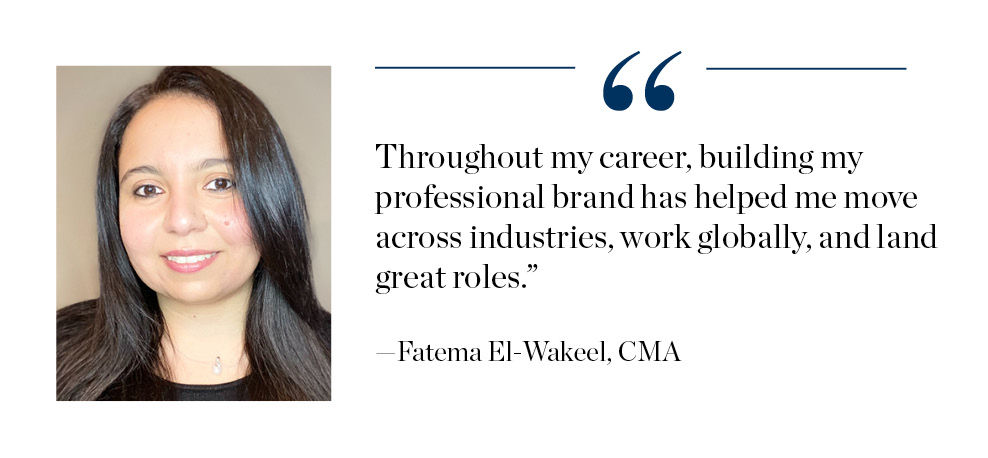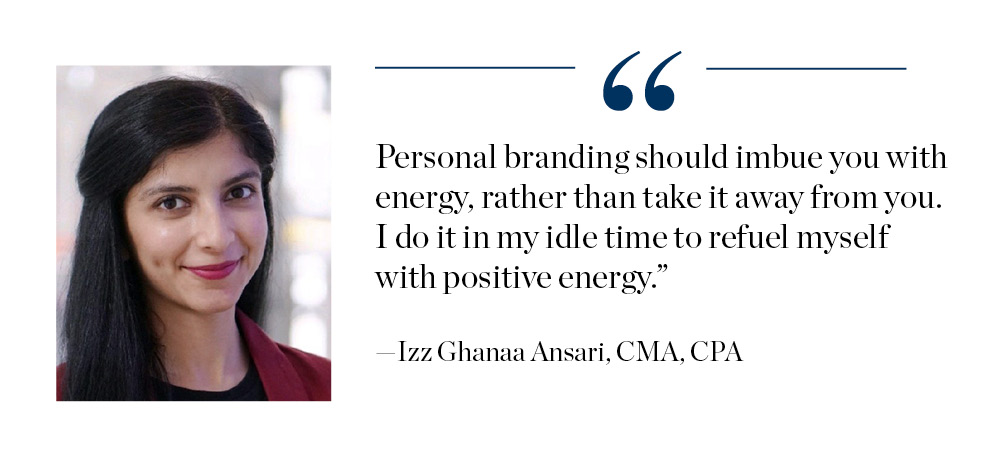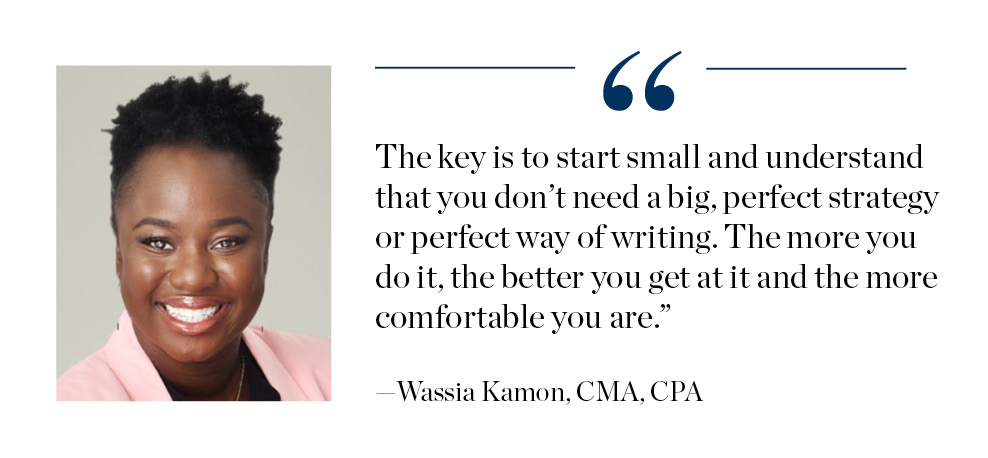There’s a reason companies like Apple, Visa, and Louis Vuitton invest so heavily in building—and protecting—their brands: It helps them boost engagement and loyalty with their audiences. But creating a powerhouse brand isn’t just for companies. The same principles can work for management accountants who want to advance in their careers. Whether you’re speaking at a conference, posting on social media, or hosting a lunch and learn, you’re putting yourself out there—and creating your very own brand.
This isn’t just a vanity play. Building your personal brand can help you stand out in an increasingly competitive job market. Staffing firm Aerotek found that about 70% of job seekers in the United States felt they had to exert extra effort to find a job in the current economy. The accounting profession is in similar flux. Among accounting and finance professionals who intend to leave their current employer or even the profession, three in four cited career advancement concerns, according to an IMA/Robert Half survey published in October 2023.
Given the landscape, now is the time to invest in your brand. “Your personal brand is who you are, just like your CV and cover letter,” said Fatema El-Wakeel, Ph.D., CMA, a cross-industry global leader working for Unilever and a data strategy researcher at University of Cambridge, in London. “It is why you will be hired, asked to speak in conferences, and be able to support your own profession through sharing knowledge.”
Here are just a few personal branding tactics you can deploy:
- Post on LinkedIn about using AI to analyze data
- Organize a lunch and learn at your company on financial trends in small business
- Speak at a conference about leadership
- Lead a webinar on ESG reporting
- Join your organization’s DE&I employee group
- Guest on a podcast episode about the evolving role of CFOs.
For El-Wakeel, using a combination of such personal branding practices has helped her grow an impressive professional network, polish her communication skills, and transform her leadership capabilities.
“Throughout my career, building my professional brand has helped me move across industries, work globally, and land great roles,” said El-Wakeel. “It has also opened opportunities to support other professionals, speak in conferences, and share knowledge.”
How can you launch your own personal brand blitz? Here’s a three-step strategy:
1. Define Your Professional Persona
Personal branding efforts require focus and direction. And it starts with an assessment: What professional topics are you most passionate about? What kind of brand image do you want to project? What experiences and responsibilities have been most seminal in your career? What mistakes have you learned from? What advice do you often give to colleagues?
Exploring such questions can help ensure you chart a strategic course for your personal branding journey. “It’s important to know what you want to be recognized for,” said Izz Ghanaa Ansari, CMA, CPA, a strategy manager at Day & Ross in Toronto. “Is there a particular niche in your subject area or your personality that you want to keep at the forefront of your brand?”
Apart from being recognized as a subject matter expert in strategy, for example, Ansari wanted to elevate her reputation as an empathetic leader and be seen as someone willing to put in extra effort to help others professionally. “Once I knew what traits I value in myself, I brought them to the top of my strategic vision,” she said.
But don’t just look within. It also helps to consider what topics will resonate with your audience. When Wassia Kamon, CMA, CPA, launched her personal branding efforts, she studied how her skills and passions intersected with what her colleagues and companies in the industry were looking for. “Once you nail that sweet spot, it’s easier to come up with a strategy,” said Kamon, CFO of Access to Capital for Entrepreneurs in Atlanta.
For El-Wakeel, that means tailoring her brand to highlight her experience with data strategy and emerging technologies—the type of knowledge she wishes she’d sought early in her career.
Looking back also helps Kamon determine potential topics for presentations, LinkedIn posts, and articles. “I think: ‘What would you have told yourself five or 10 years ago?’ What are some of the things I’ve learned that I wish I had known when I was 20 or 25?” she said.
2. Commit to a Brand Activities Plan
Once you decide what you want your brand to represent, it’s time to execute—and building up your branding typically takes time. Nobody earns a TED Talk overnight. But even just one LinkedIn post a month may be enough to make a splash, said Kamon.
Start by sharing an interesting article, personalizing a repost with your own point of view, or commenting on someone else’s posts. If you want to dive deeper, launch a blog or podcast.
“The first time is always the weirdest. The key is to start small and understand that you don’t need a big, perfect strategy or perfect way of writing,” Kamon said. “What I have noticed in my own journey is the more you do it, the better you get at it and the more comfortable you are.”
In 2022, for example, she spent two months working on a LinkedIn carousel post outlining accounting and finance certifications. Kamon second-guessed herself for weeks. But she finally gained the courage to publish, and the post went viral—earning 169 comments, 216 reposts, and 1,724 reactions.
“I gained over 1,000 followers overnight,” Kamon said. “I didn’t want to post, so I was very much overthinking at the beginning.”
Another way to boost your brand? Attend an IMA chapter meeting, and use what you learn as fodder for your own content. Case in point: A solid set of notes can be curated into a post that recaps the discussion, with your own POV folded in. You can even personalize it by adding a selfie with colleagues. Or turn your meeting notes into a lunch-and-learn presentation for your team or company.
Sharing insights helps bolster your reputation as someone invested in improving your team’s performance—and position you as a thought leader in your industry. The result? “You’re not just a leader at work, but you’re also a leader outside of work,” Kamon said.
Building your personal brand takes more than a few speaking gigs or social posts written on the fly, so you need to set realistic expectations and hold yourself accountable. Kamon writes posts during downtime and schedules them to go live during the week to maximize visibility. Such strategies can help you balance your personal branding efforts with other professional and personal responsibilities—so you don’t miss a beat at work or at home.
Done right, it shouldn’t feel like a huge chore. “Personal branding should imbue you with energy, rather than take it away from you,” said Ansari. For her, sharing LinkedIn posts or helping people navigate their career paths provides a sense of personal achievement. “I do it in my idle time to refuel myself with positive energy. It’s easier and healthier to think about it this way, rather than making it a matter of time management.”
3. Measure Your Brand’s Impact
How do you know if your personal branding efforts are working? Tracking quantitative metrics like LinkedIn impressions or podcast downloads is an effective way to gauge if your influence is growing. For example, since Kamon started posting on LinkedIn in 2021, she’s gained more than 25,000 followers.
But the qualitative impact can be even greater: invitations to speak at conferences, tips picked up through informal knowledge sharing, and new and improved job prospects. Since focusing on personal branding, Kamon has earned a spot on the board of a local nonprofit, as well as a leadership role in the IMA Atlanta Chapter in 2022 and 2023. Now, with all of her growth and activity, she must turn down some speaking engagements.
El-Wakeel and Ansari have experienced similar benefits.
“Personal branding has brought credibility to my professional experience,” Ansari said. “You interact with so many fellow and senior professionals that they learn a lot about you and your experience organically, instead of you having to show them your résumé.”
Of course, building your personal brand is a two-way street—an opportunity to connect with your audience in a way that promotes a virtuous cycle of feedback. For instance, Kamon recommends commenting on other people’s posts five times for each one you publish. She also tries to respond to comments and direct messages on her posts to show she’s invested in the insights of others.
“When you have a reputation as someone who’s always willing to offer help, it’s also easier to receive help,” Ansari said. “If I have a professional query, it’s easier to reach out to people and solicit a response, which contributes to my professional development.”
The true measure of a powerful personal brand isn’t just about how many likes, listens, reads, and follows you’ve racked up. It’s about accelerating career growth for you—and your audience. “The feedback from messages and comments really does make my day,” El-Wakeel said, “because it shows me that what I share is making a difference to other people’s careers.”






